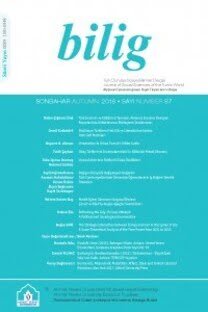Türk Dillerinde Odaksıl Şimdiki Zaman İşaretleyicisi ve Kıbrıs Türkçesinde Eksikliği
Türkçenin eski dönemlerinde geniş zaman ekleri odaksıl şimdiki zamanı da gösteriyordu. Türk dilleri çoğu zamanla odaksıl şimdiki zaman biçimleri geliştirmiştir. Kıbrıs'ta konuşulan Türkçe şimdiki zaman yenilenmesinin gerçekleşmediği az sayıda varyanttan biridir. Bunun en önemli nedeni, Türkiye Türkçesindeki -(I)yor tipinin, adaya Türk göçlerinin olduğu dönemden sonra ortaya çıkmış olmasıdır. Söz konusu biçimin Standart Osmanlıcada 18. yüzyıla kadar yaygınlaşmamış olması da bunu gösterir. Buna karşılık bazı Türkçe varyantlarda görülen şimdiki zaman işaretleyicisi {-(y)Ir}'ın, zarffiil + yüri-r biçiminden geliştiği düşünülür. Bu, büyük bir ihtimalle yanlıştır. Yazıda Türk dillerinde odaksıl şimdiki zaman işaretleyicileri ve Kıbrıs Türkçesinde bu işaretleyicinin neden eksik olduğu kısaca ele alınmaktadır.
Turkic Focal Present Tense Markers and Their Absence in Cypriot Turkish
This study focuses on Turkic focal present markers and the possible reasons for the absence of this marker in Cypriot Turkish. In older Turkic, present markers could also function as focal present markers. Most modern Turkic languages have developed special focal present forms. Cypriot Turkish is one of the few varieties that have not undergone a focal present renewal. The reason is that the -(I)yor type in Turkish as spoken in Turkey emerged after the period of Turkish emigration to the island. This is also indicated by the fact that this type did not become widespread in Standard Ottoman until the 18th century. On the other hand, it is generally assumed that the focal present tense marker -(y)Ir found in certain variants of Turkish has developed from the converb + yüri-r. This is most probably incorrect.
___
Brendemoen, Bernt (2002). The Turkish dialects of Trabzon. Their phonology and historical development 1-2. (Turcologica 50.) Wiesbaden: Harrassowitz.Demir, Nurettin (baskıda). "Zum fokalen Präsens in zyperntürkischen Dialekten". Boeschoten, Hendrik & Julian Rentzsch (Hrsg.). Sammelband zum Symposium "Die Turkologie in Mainz: Traditionen und Perspektive" (Mainz, 9.-11. Juni 2006). Wiesbaden: Harassowitz.
Demir, Nurettin & Johanson, Lars (2006). "Dialect contacts in Northern Cyprus". International Journal of the Sociology of Language 181: 1-9.
Hazai, György (1973). Das Osmanisch-Türkische im XVII. Jahrhundert. Untersuchungen an den Transkriptionstexten von Jakab Nagy de Harsány. Bibliotheca Orientalis Hungarica 18. Budapest: Akadémiai Kiadó.
Johanson, Lars (1994). "Türkeitürkische Aspektotempora". Tense systems in European languages. Eds. R. Thieroff & J. Ballweg. Tübingen. 247-266.
(1997). "A grammar of the 'lingua turcica agemica'". Studia Ottomanica. Festgabe für György Hazai zum 65. Geburtstag. Eds. Kellner-Heinkele, Barbara & Peter Zieme. Veröffentlichungen der Societas Uralo-Altaica 47. Wiesbaden: Harrassowitz. 87-101.
(1989). "Aorist and present tense in West Oghuz Turkic". Journal of Turkish Studies 13: 99-105.
(2000a). "Traces of a Turkic copula verb". Turkic Languages 4: 235-238.
(2000b). "Viewpoint operators in European languages". Tense and aspect in the languages of Europe. Ed. Dahl, Östen. Berlin & New York: Mouton de Gruyter. 27-187.
(2004). "Turkish in Trabzon". Turkic Languages 7: 275-296.
- ISSN: 1301-0549
- Yayın Aralığı: Yılda 4 Sayı
- Başlangıç: 1996
- Yayıncı: Ahmet Yesevi Üniversitesi Mütevelli Heyet Başkanlığı
Sayıdaki Diğer Makaleler
Türk Dillerinde Odaksıl Şimdiki Zaman İşaretleyicisi ve Kıbrıs Türkçesinde Eksikliği
Nergisî’nin Meşâkku’l-Uşşâk’ında Osmanlı Toplum Hayatından Yansımalar
Yayın Değerlendirme / Review Türkoloji Tarihinde Samoyloviç ve Eserleri
Balcı Yunus (2008). Tanpınar, Trajik Bir Şair ve Şiiri. İstanbul: 3F Yayınları 157 s.
Nergisî'nin Meşâkku'l-Uşşâk'ında Osmanlı Toplum Hayatından Yansımalar
Avrupa Birliği'nin Yeni Mottosu 'Farklılıkta Birlik' ve Türkçenin 'Farklılıkta Birlik'teki Yeri
Sultan Abdülmecid Döneminde İstanbul-Ayasofya Camii’ndeki Onarımlar ve Çalışmaları Aktaran Belgeler
